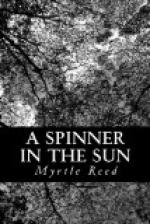“Only—only—” stammered Araminta; “my mother, you know. She was—was married.”
“Poor child,” said Ralph, beginning to comprehend. “Have you been taught that it’s wrong to be married?”
“Why, yes,” answered Araminta, confidently. “It’s dreadful. Aunt Hitty isn’t married, neither is the minister. It’s very, very wrong. Aunt Hitty told my mother so, but she would do it.”
There was a long pause. The little warm hand still rested trustingly in Ralph’s. “Listen, dear,” he began, clearing his throat; “it isn’t wrong to be married. I never before in all my life heard of anybody who thought it was. Something is twisted in Aunt Hitty’s mind, or else she’s taught you that because she’s so brutally selfish that she doesn’t want you ever to be married. Some people, who are unhappy themselves, are so constituted that they can’t bear to see anybody else happy. She’s afraid of life, and she’s taught you to be.
“It’s better to be unhappy, Araminta, than never to take any risks. It all lies in yourself at last. If you’re a true, loving woman, and never let yourself be afraid, nothing very bad can ever happen to you. Aunt Hitty has been unjust to deny you life. You have the right to love and learn and suffer, to make great sacrifices, see great sacrifices made for you; to believe, to trust—even to be betrayed. It’s your right, and it’s been kept away from you.”
Araminta was very still and her hand was cold. She moved it uneasily.
“Don’t, dear,” said Ralph, his voice breaking. “Don’t you like to have me hold your hand? I won’t, if you don’t want me to.”
Araminta drew her hand away. She was frightened.
“I don’t wonder you’re afraid,” continued Ralph, huskily. “You little wild bird, you’ve been in a cage all your life. I’m going to open the door and set you free.”
Miss Evelina tapped gently on the door, then entered, with a bowl of broth for the invalid. She set it down on the table at the head of the bed, and went out, as quietly as she had come.
“I’m going to feed you now,” laughed Ralph, with a swift change of mood, “and when I come to see you to-morrow, I’m going to bring you a book.”
“What kind of a hook?” asked Araminta, between spoonfuls.
“A novel—a really, truly novel.”
“You mustn’t!” she cried, frightened again. “You get burned if you read novels.”
“Some of them are pretty hot stuff, I’ll admit,” returned Ralph, missing her meaning, “but, of course, I wouldn’t give you that kind. What sort of stories do you like best?”
“Daniel in the lions’ den and about the ark. I’ve read all the Bible twice to Aunt Hitty while she sewed, and most of the Pilgrim’s Progress, too. Don’t ask me to read a novel, for I can’t. It would be wicked.”
“All right—we won’t call it a novel. It’ll be just a story book. It isn’t wrong to read stories, is it?”




